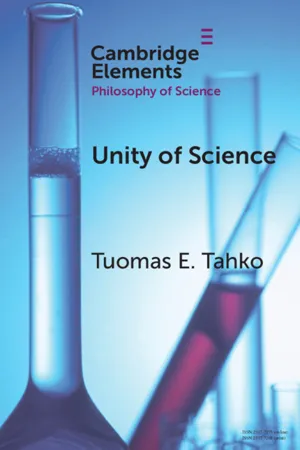Unity of Science
About this book
Unity of science was once a very popular idea among both philosophers and scientists. But it has fallen out of fashion, largely because of its association with reductionism and the challenge from multiple realisation. Pluralism and the disunity of science are the new norm, and higher-level natural kinds and special science laws are considered to have an important role in scientific practice. What kind of reductionism does multiple realisability challenge? What does it take to reduce one phenomenon to another? How do we determine which kinds are natural? What is the ontological basis of unity? In this Element, Tuomas Tahko examines these questions from a contemporary perspective, after a historical overview. The upshot is that there is still value in the idea of a unity of science. We can combine a modest sense of unity with pluralism and give an ontological analysis of unity in terms of natural kind monism. This title is available as Open Access on Cambridge Core.
Tools to learn more effectively

Saving Books

Keyword Search

Annotating Text

Listen to it instead
Information
Table of contents
- Cover
- Title page
- Copyright page
- Unity of Science
- References
Frequently asked questions
- Essential is ideal for learners and professionals who enjoy exploring a wide range of subjects. Access the Essential Library with 800,000+ trusted titles and best-sellers across business, personal growth, and the humanities. Includes unlimited reading time and Standard Read Aloud voice.
- Complete: Perfect for advanced learners and researchers needing full, unrestricted access. Unlock 1.4M+ books across hundreds of subjects, including academic and specialized titles. The Complete Plan also includes advanced features like Premium Read Aloud and Research Assistant.
Please note we cannot support devices running on iOS 13 and Android 7 or earlier. Learn more about using the app
